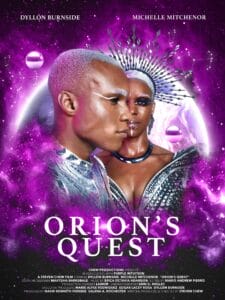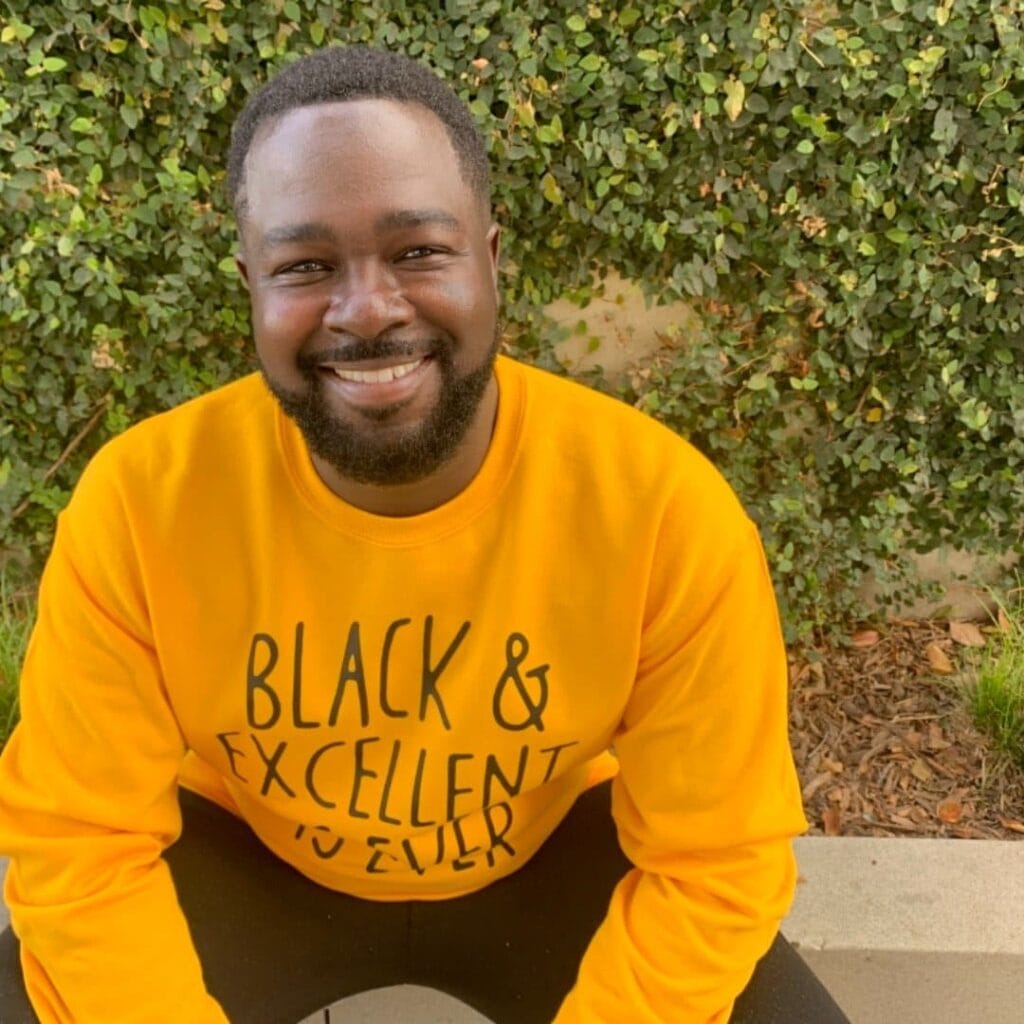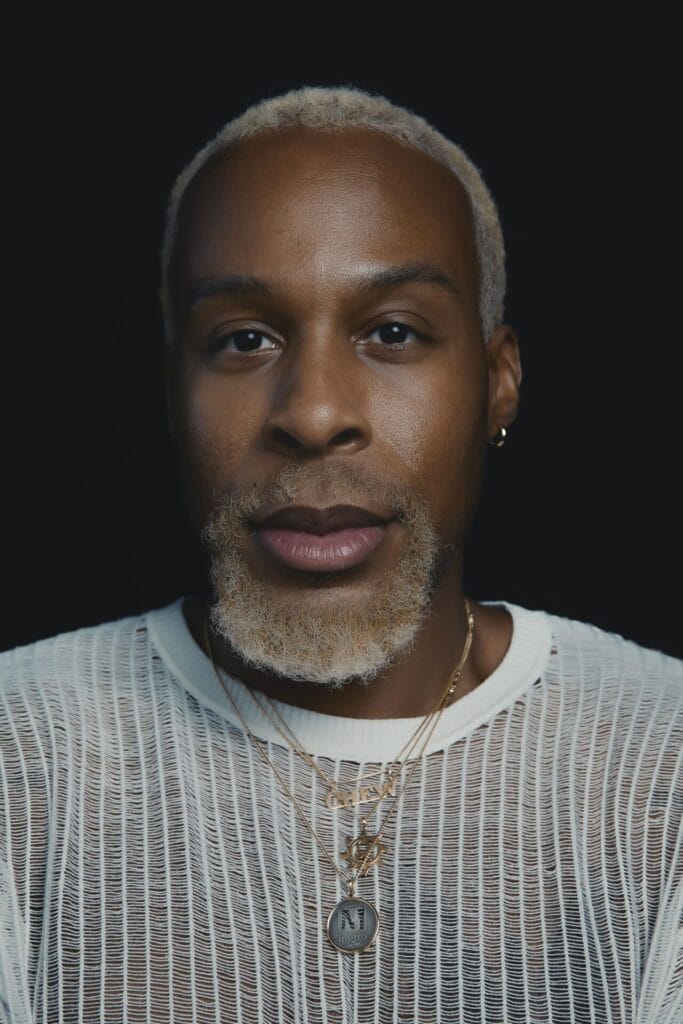Orion’s Quest emerges as a bold and beautiful take in Black, queer storytelling. Written and directed by Steven Chew and produced by Nasir Kenneth Ferebee, the film explores love, intimacy, and identity through the eyes of an extraterrestrial being sent to understand human connection. Starring Dyllón Burnside (Pose, Da Understudy) and Michelle Mitchenor (Lethal Weapon), the story follows a cosmic observer who journeys through the romantic lives of Black gay men—offering a rare and deeply emotional look at love that’s both otherworldly and achingly human.
Ahead of its premiere at the 2025 NewFest Pride Film Festival, Orion’s Quest has already begun to spark conversation around the intersections of queerness and Afrofuturism. The film challenges audiences to rethink how we define love and visibility—reminding us that queer stories are not just earthbound; they are limitless, vast, and worthy of the stars.
GLAAD caught up with Nasir Kenneth Ferebee, Steven Chew, and Dyllon Burnside to talk about the film’s inspiration, the creative process behind bringing this universe to life, and what it means to see Black queer love represented on a cosmic scale.

——
GLAAD: Orion’s Quest blends science fiction and love in such a powerful way. What initially drew each of you to this story?
NASIR: What drew me to this story was the sci-fi elements of it. This is my first project that incorporates sci-fi, and I’m always eager to do projects that are new, exciting, and groundbreaking. Orion’s Quest fits that mold.
STEVEN: What drew me to this story was really my own experiences with dating; all the trials, lessons, and growth that came with it. I was actually working on another script at the time that had a science-fiction element. It was my first time experimenting with that genre and something about it wasn’t fully clicking. Meanwhile, I was navigating my own romantic ups and downs, and as an artist, I’ve always believed you’re called to speak from where you are in life. So I decided to fuse the two, the sci-fi concept I’d been developing and the very real emotions I was processing and that combination became the spark that gave birth to Orion’s Quest.
DYLLÓN: I’ve always been drawn to sci fi and adventure stories. It’s something I’ve been wanting to do for a really long time. To play in mythical, mystical or supernatural worlds and bring humanity to it.
GLAAD: What do you hope audiences take away from this story, both emotionally and intellectually?
NASIR: I hope that audiences recognize that love is love and it can come in all forms. We all desire love and we all deserve love. Our Black queer sci-fi love story deserves to be celebrated and seen just like any other love story. It just may look a little different and new.
STEVEN: I hope audiences take away that love is universal and that self-love is an essential part of finding love and partnership. Emotionally, I want people to feel seen and reminded that love, in all its forms, connects us. Intellectually, I hope Orion’s Quest encourages audiences to think more expansively about Black storytelling and to see that Black, queer love stories can exist within imaginative, genre-bending worlds. Ultimately, I want the film to invite people to think creatively about how we tell our stories, and to recognize that themes of love, identity, and connection transcend boundaries.
DYLLÓN: I’m sort of moving away from making those kind of statements about what I want people to take away from my work. Honestly, I think art and narrative reaches folks in ways that can be very personal and can’t be predicted. My goal is for the work to connect in a real. That someone might be moved, inspired, or feel seen.

GLAAD: The film premieres at NewFest Pride Film Festival this month, what does it mean to debut this project in that space?
NASIR: It’s such a huge honor to screen our film at NewFest Pride Film Festival. It’s an incredibly prestigious festival, and I’ve been fortunate to win an audience award there before so I’m honored to be playing it again.
STEVEN: It’s incredibly special to debut Orion’s Quest at NewFest because it speaks directly to our community , to the queer community, and more specifically, to the Black queer artist community. It feels meaningful to share a story that centers Black queer love, because even within queer spaces, those narratives are still far too rare. For me, this premiere isn’t just about visibility, it’s about expanding what representation looks like within queer cinema. To showcase a Black queer love story in a space that celebrates our community feels both powerful and deeply affirming.
DYLLÓN: I’m really grateful for spaces and festivals like NewFest that has been such an incredibly important institution for cinema and the canon of queer works in cinema. It’s an honor to have our film be apart of that legacy.
GLAAD: What’s next for each of you, and for the Orion’s Quest universe?
NASIR: I have a few projects coming down the pipeline. The first of which is a digital series entitled G’Uncles. It’s about a Black gay married couple that inherit twelve-year-old twins. I’m also shopping a cooking show entitled Mama’s Kitchen along with another film with written by Steven Chew entitled Give The Drummer Some which is a coming of age story about an all-female gogo band set in the late eighties in Southeast DC.
STEVEN: What’s next for me is continuing to explore stories that highlight unique dynamics within the Black experience and that’s really where I’ve found my creative sweet spot. I’m currently developing another short film that delves into that space in a new and unexpected way. As for Orion’s Quest, I’m excited to see where this world might go. I initially conceived it purely as a short film, but as the story and response have grown, I can’t help but imagine how it could expand even further. There’s a universe here that I’d love to continue exploring.
DYLLÓN: I’m currently in development for the feature film I wrote, “Unbroke”. I’m excited to bring it to life and to share more of my voice as a filmmaker.

GLAAD: Dyllón, What conversations did you have with Steven that helped shape your understanding of the character’s journey?
DYLLÓN: When Steven approached me to work on the film, we both seemed to be curious about the challenges in modern dating and love. It’s something that I’ve been incredibly curious about and exploring in a lot of my work so I jumped at the opportunity to be able to investigate it in this context.
GLAAD: The film touches on the vulnerability of Black queer love, how did that resonate with you personally and artistically?
DYLLÓN: I think vulnerability is the most terrifying thing to access, especially in a world that seems to penalize and dissuade men from engaging with it. As a person and as an artist, I’ve worked really hard to find comfort and safety in vulnerability. To share it in my work and in my life.
GLAAD: Nasir, what was the most rewarding, and most challenging, part of producing a film that bridges such distinct genres like romance, sci-fi, and queer narrative?
NASIR: The most challenging part of this process was the typical issues that come up with producing a project. It can be a cast member getting sick and having to replace them. It can be budget constraints with the use of visual effects. All of those came into play with this project.
GLAAD: What does this film represent for you personally as a storyteller within the Black queer creative community?
NASIR: This film represents the celebration of love that we all desire to feel. There can be so many challenges within dating within the Black queer community. Being Black and gay is such a self-love journey especially considering our current state so us loving one another is a phenomenal revolutionary act.
GLAAD: The concept, an extraterrestrial learning about love through the lens of Black gay men, how did that idea first come to you?
STEVEN: That idea really came from my own experiences both as a Black gay man and as someone navigating the complexities of dating. At the time, I was also developing a separate project that had a sci-fi element, but I couldn’t quite figure out how to make it work. Eventually, I realized I could merge those two worlds , the emotional reality of what I was experiencing in my personal life and the imaginative framework of science fiction. Bringing those elements together gave birth to Orion’s Quest in a way I didn’t initially foresee, but it ended up becoming something deeply personal and creatively fulfilling.

GLAAD: What was it like collaborating with Dyllón Burnside and the rest of the cast to translate your vision to screen?
STEVEN: It was such an incredible experience collaborating with Dyllón Burnside. He brought a tenderness and nuance to the role that expanded even my own understanding of the character of Orion. Through our collaboration, we were able to delve deeper into Orion’s backstory, his quirks, and what it truly means to exist as this extraterrestrial being navigating love. He brought such thoughtful mannerisms and depth that really elevated the story. Michelle Mitchenor was also extraordinary as Queen Polaris. She completely transformed for the role, immersing herself in everything from costume and hair to the physicality of the character. Her commitment was inspiring to watch. Obio Jones, who played Marcus, brought such magnetism to the screen. This was his first acting role, and he absolutely delivered. And Nigel Cox, who plays Andre, brought such heart and emotional weight to the film. His closing monologue ties the entire story together in such a moving way. I truly couldn’t have asked for a better group of collaborators. Every actor brought something unique, personal, and powerful to their roles and together, they made Orion’s Quest what it is.
Be sure to check out Orion’s Quest Instagram at @orionsquestfilm and follow Narir at @nasirkennethferebee, Steven Chew at @Chewchronicles and Dyllón Burnsides at @dyllonburnside.













